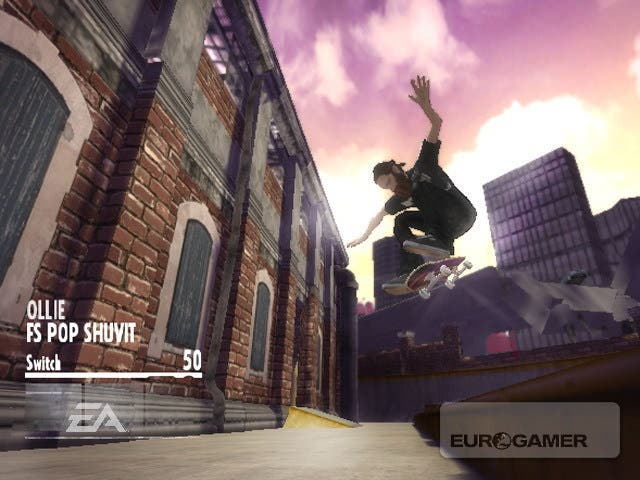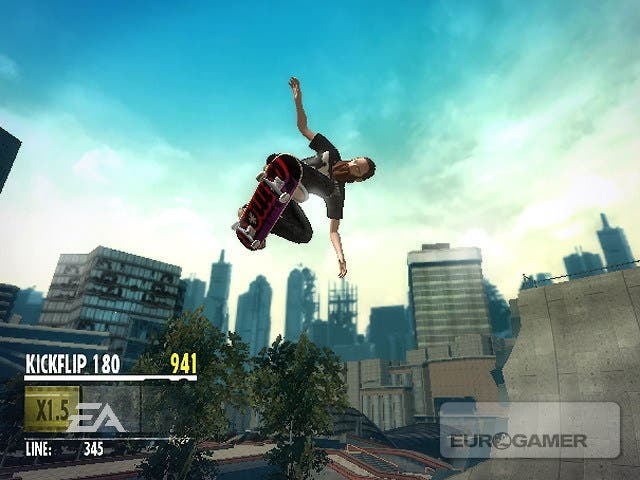Skate It
Skate expectations.
Skate wasn't built for the DS and Wii, and that's presented EA with something of a problem. How can you get a gameworld filled with milling pedestrians and wide-open draw distances to work on less powerful hardware? Its solution with Skate It, due out later this year, is to bring in a series of "comical natural disasters" (their words, not ours) to kick the city of San Vanelona into more manageably angular chunks of geometry, and clear out ninety-nine percent of the original population. God may work in mysterious ways, then, but sometimes He can be alarmingly platform-specific.
Last year's Skate sought to bring about a calm and efficient re-examination of the tired business of getting ollies and shuv-its onto consoles. The game had a lot going for it: a sensible focus that put the feet and board centre-stage, the Flickit analogue control system, and a city name in San Vanelona that was not only obviously designed by committee, but presumably a committee of idiots, too. EA's risky strategy took the house of Hawk by storm, outselling the creaky Proving Ground, and bringing new life to a genre that was starting to look a bit worn-out. With success like that, a franchise was inevitable.
Despite all that, Skate It still has its work cut out for it: the idea of a game that wrought pure gold out of analogue sticks turning up on two machines not over-blessed with sticks of any kind may make you think of a whole different kind of natural disaster. But hands-on with both DS and Wii versions of the game reveals plenty of pleasant surprises: Skate has certainly changed to accommodate its new hosts, yet the results are already looking promising. But if you're waiting for Skate 2, this certainly isn't it. That game's definitely on its way, but it'll be slamming awkwardly into dustbins on PS3 and 360 at the end of the year. Instead, Skate It is a mutation of the central concept - a series off-shoot, rather than a continuation.

The basic idea across both platforms, however, remains unchanged. Single-player is once again about pulling off tricks and earning sponsors, and there's the same simple collection of moves that can be built into dizzyingly complex chains. The play area has changed a bit, partly due to all those hilarious calamities in the back-story providing new locations, and partly through the option to head out of town and explore "iconic skating spots" around the world (although not, rather disappointingly, the legendary ramp on Brighton seafront where, decades ago, I fell off my brother's skateboard and hit my head so hard that for the rest of the day I thought the seagulls were trying to talk to me).
The Wii version is already starting to look the part: its world, though simplified, retains the distinct silver-skies-and-sunny-concrete ambience of its older brother (probably because it's using a modified version of the original game engine), and the physics and animation are both solid. It's the control that really counts, though, and EA admits it's been challenging moving from the precision of analogue sticks onto the more iffy motion-sensing technology of the Wii remote.

The developer's been through a lot of control iterations on the way, some of which apparently caused personal injuries amongst the team, before arriving at the present solution: treating the remote as if it is the actual skateboard. Tilt it left and right to turn, lift it for an ollie, and twist for flips; every move from the original game is available, and, trying it out, it's immediately clear how this solution cuts through the often-confusing jargon of most skating games. These are controls at their most instantly intuitive: if you know what you physically want the board to do, you'll have pretty much worked out which gesture to use in order to do it, since it's simply a question of mimicking the correct position with the remote. Because of this, some of the more difficult tricks from Skate can now be mastered in about two minutes - a shuv-it, followed by a landing on the end of the board, was one of the harder moves from the original game, and even I, with a family history filled with the spasm-handed and clutzish stretching back to The Charge of the Light Brigade, could pull it off after a few attempts.


